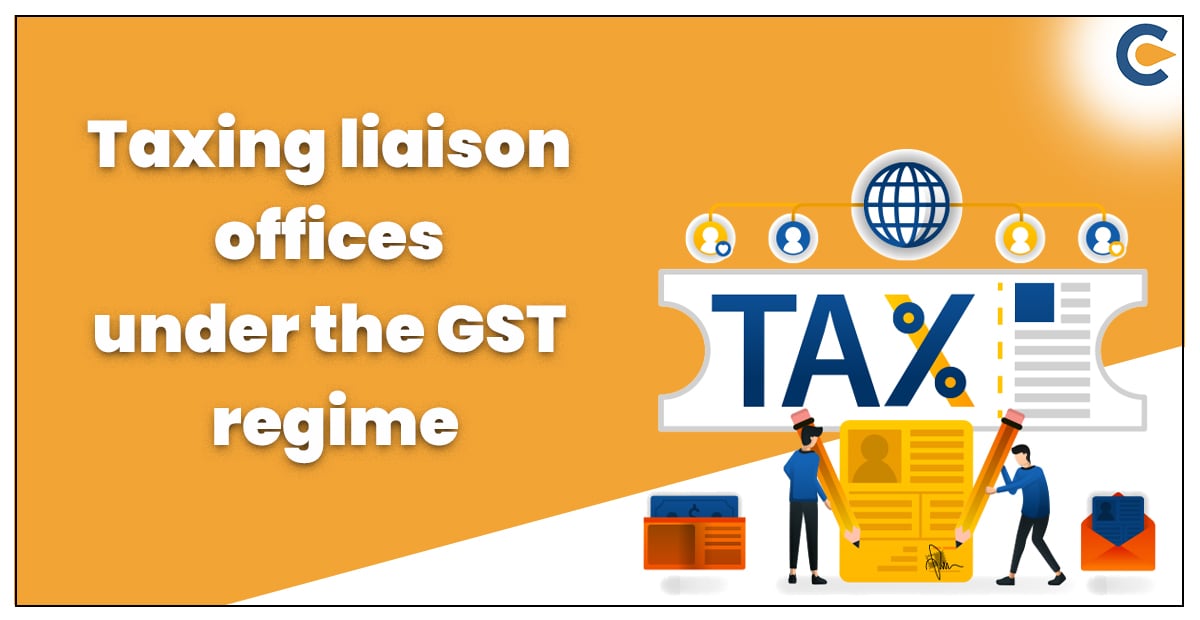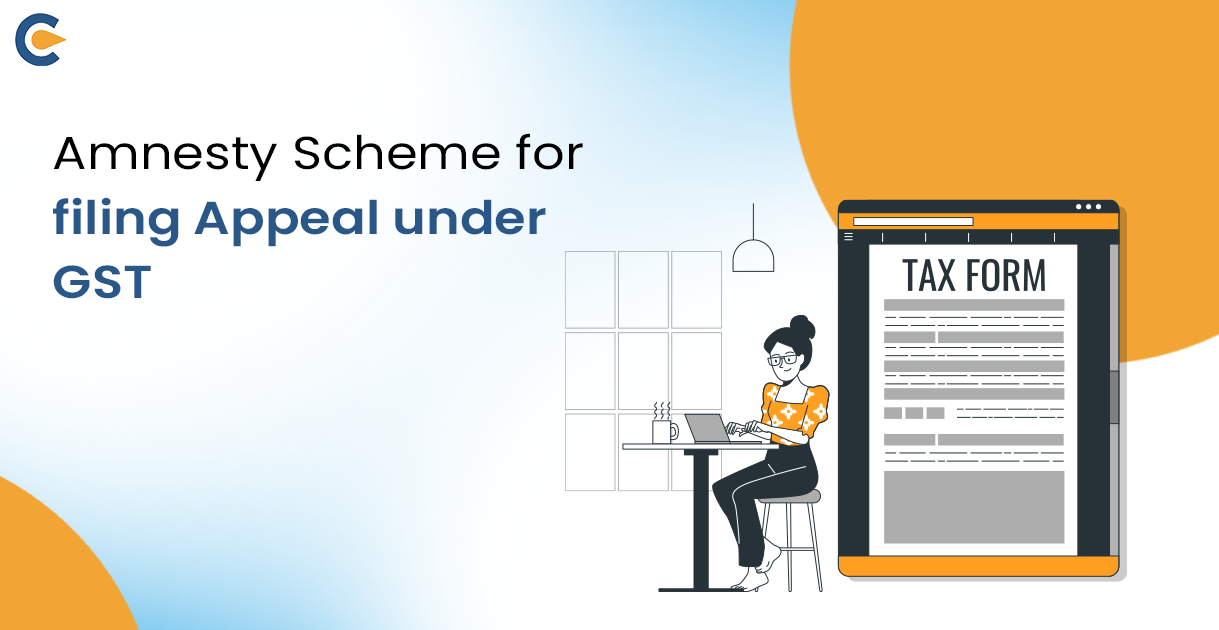After obtaining the previous clearance from the Reserve Bank of India (RBI), a firm resident outside of India may begin doing business in India by opening a subsidiary, branch office, liaison offices, project office, or any other location of business by whatever name is called. The establishment of any of the aforementioned company locations has various tax ramifications. The current discussion focuses on how the Goods and Services Tax (GST) system would affect liaison offices’ tax obligations.
What is a Liaison Office?
Let’s first explore the definition of a liaison offices in India before discussing the specific consequences of the GST.
As the name implies, liaison offices help establish tight working contacts between the parent firm that is based overseas and the business parties in India. Representative Office is another name for a liaison office. Liaison offices are subject to limitations and are not permitted to conduct any business activity or generate any money in India.
Only the following actions can be carried out by the liaison offices in India:
- Represent the international business in India.
- Encourage imports into or exports from India.
- Encourage parent or group corporations to collaborate with Indian enterprises on technological and financial projects.
- Serve as the parent company’s and the Indian company’s communication route.
The Foreign Exchange Management Regulations of 2016 (FEMA Regulations) define a liaison office as a place of business that serves as a channel of communication between the principal place of business or head office, by whatever name called and entities in India but which does not engage in any direct or indirect commercial, industrial, or trading activity, and which sustains itself through inward remittances received from abroad through normal banking channel.
Thus, it may be inferred that the liaison office’s only function is to serve as a conduit for information between the corporate headquarters and Indian clients. It is not permitted to engage in any income-producing activity. In other words, it solely receives head office reimbursements for the costs incurred.
As a result, RBI grants the following permissions to the liaison offices:
- In India, representing the main firm and other group companies.
- promoting import and export to/from India.
- Fostering technological and financial partnerships between parent/group firms and Indian businesses.
- Serving as a conduit for communication between Indian and parent firms.
However, liaison offices are prohibited from engaging in the following activities:
- Exporting or importing goods;
- Selling and buying goods domestically;
- Providing any type of professional or consulting services;
- Paying dividends;
- Borrowing or lending money;
- Engaging in any other activity that generates income.
The FEMA Regulations provide an eligibility condition for setting up a liaison office in India. It stipulates that a person outside of India is permitted to open a liaison office there as long as they have a profitable track record in their home country and a net worth of at least USD $50,000. As a result, the liaison office’s only function is to serve as a conduit for information between the corporate headquarters and Indian clients. It is not permitted to engage in any income-producing activity. The costs incurred it is reimbursed by the corporate office. The question that now needs to be answered is whether or not the activities carried out by the liaison office and the expenditures that the head office reimbursed to the liaison office are subject to GST. We must first comprehend the following ideas in order to respond to this.
What is the requirement for setting up a Liaison Office?
In accordance with the regulations of the Foreign Exchange Management Act, 1999 (the “FEMA”), the parent firm is required to acquire approval from the Reserve Bank of India (RBI) before creating a liaison or branch office. The RBI will evaluate the applications in Form FNC in one of two ways:
Reserve Bank Route: Applications will be processed by RBI if the foreign parent firm’s primary business line falls under the 100 industries eligible for 100% Foreign Direct Investment (FDI) under the automatic route.
Government Route: The RBI will consider such applications in consultation with the Ministry of Finance, Government of India, if the primary business of the foreign parent company does not fall under the 100 sectors where 100% FDI is permitted under the automatic route or if the application is from a company that is a non-profit organisation, non-government organisation, government body, or department.
The RBI will also consider the following factors when sanctioning a parent company’s liaison or branch office.
For the formation of a liaison office, branch office, project office, or any other place of business, the parent firm must submit an application in Form FNC (as per Annex B of the Foreign Exchange Management Regulations, 2016) after meeting the qualifying requirements.
Liaison Office under the GST regime
In the current day of globalisation, when the economy is accessible to everybody, any corporation may establish its operations in any other nation they want. According to this fact, any corporation from outside India that wishes to start doing business there may do so by opening a liaison office, project office, branch office, or subsidiary there with the prior consent of the Reserve Bank of India.
According to Section 22 of the CGST Act, every supplier who has an annual aggregate turnover of more than twenty lakh rupees must register with the GST in the state from where they provide taxable products, services, or both.
What do we mean by supply?
As a result, in accordance with Sections 1 to 8 of the IGST Act’s explanation, services provided by a liaison office to its foreign office would not be covered by Schedule 1 of Section 7 of the CGST Act of 2017, as the liaison office and foreign office are neither related persons under Section 15 of the act’s explanation nor distinct persons under Section 25 of the act. Both would be handled as a single corporation.
What do you mean by a distinct person?
According to Section 25 of the CGST Act, a person who has obtained or is required to obtain more than one registration shall, with respect to such registrations, be treated as distinct persons for the purposes of this Act, whether in one State or Union Territory or more than one State or Union Territory.
The goal of this provision is to distinguish between two entities or two parts of a single entity for indirect taxation purposes where, ordinarily, only one would be considered to be a separate entity. For instance, even though two branches of the same organisation that are physically located in separate states are a part of the same organisation, they would be handled differently. This different person theory cannot be used in the case of a liaison office since the latter only serves as an extension of the former and does not function independently of either. A liaison office is only authorised to represent a foreign organisation in India; no actual operations may be carried out there. Instead, it serves as the outer face of that organisation.
This serves as a prelude to a few Advance Authority Rulings on the taxability of liaison offices in India under GST that the GST Council passed, and the same has been covered in detail below.
To put all of the reasons mentioned above, simply, the Liaison office is expressly forbidden from engaging in any trading or commercial activity. Even worse, it is not allowed to sign any commercial agreements in its own name. As a result, the liaison office does not make any taxable supplies, and as a result, Section 22 of the CGST Act of 2017 does not need registration under the GST legislation. Since the liaison office and foreign office are neither related persons as defined by S.15 of the CGST Act of 2017, nor distinct persons as defined by S.25 of the act, they are deemed to be distinct persons for GST purposes. As a result, services provided by the liaison office to its foreign office would not be covered under transactions covered in schedule-I of Section 7 of the CGST Act of 2017. Both would be handled as a single corporation.
According to the aforementioned debate, a supply between related or different people, even without consideration, would count as a supply for GST purposes under Schedule-I of Section 7 of the CGST Act of 2017. However, since the liaison office serves as an extension of the foreign firm and the LO has no autonomous activities of its own, this idea is not relevant to the transactions between HO and LO. As a result, any funds received by the liaison office from the head office to cover expenditures like rent, salary, power, travel, etc., would likewise constitute a provision of services and so be exempt from taxation.
Relevant case laws
- Habufa Meubelen B.V.[1]
A business with its head office in the Netherlands, Habufa Meubelen B.V. The RBI has permitted them to open a liaison office in India; they are referred to as the “Applicant” from here on. The liaison office was created with the intention of communicating with suppliers on product quality control. Liaison offices rely on the head office since they have no independent source of revenue, and the head office pays all of their expenditures.
Requested an early decision on the following issues:- Whether the HO’s reimbursement of costs and wages to the India-based liaison office qualifies as a supply of services subject to GST, particularly in the absence of any payment or fee for any services.
- Is registration for GST needed for the applicant?
- What will be the location of supply if it is accepted that the reimbursement of expenditures and wages claimed by the liaison office is a consideration towards a service
Discussion
According to the definition of “service” in Section 2(102) of the CGST Act, every activity must charge a distinct consideration in order to be regarded as a service for the purposes of the GST law. Service will not be considered to be a service under the GST rules if no separate consideration is charged.
Furthermore, it is clear from reading the definitions of “service” and “supply” together that a provision of a service can only be subject to GST if a separate consideration is charged. Therefore, neither supply nor service is provided by the liaison office’s operations. Additionally, their claims for payment from their head office do not fit under the definition of providing a service. There is no need for the Liaison Office to register under the GST Act because it does not make any taxable supplies.
Ruling
The reimbursement of expenses or salary paid by the Head Office to the Liaison office is not subject to GST if the Liaison office in India does not provide any consultancy or other services directly or indirectly, for payment or not, and the Liaison office does not have significant commitment powers beyond those needed for the regular operation of the office. As a result, the Applicant is not required to obtain itself a GST number. - Fraunhofer-Gessellschaft Zur Forderung Der Angewwandten Forschung (GST AAR Karnataka)[2]
In this specific instance, it was decided that the liaison office’s activities would qualify as a supply, making the liaison office responsible for GST AWS registration - M/s Takko Holding GmbH[3]
Case specifics:
Germany serves as the country of incorporation for Takko Holding. They are allowed to have a liaison office for the Company (also known as “Takko” or the “Applicant”) thanks to RBI permission. The applicant does not have a GST registration. The applicant serves as a liaison between Indian businesses and the parent firm, which is based overseas. The applicant does not receive any fees, commissions, or other compensation for the liaison services it provides.
Requested an early decision on the following issues:- Is the liaison office responsible for paying GST?
- Does the GST Act necessitate the registration of liaison offices?
- Does a liaison office’s activity constitute the provision of services?
Conclusion
The liaison office doesn’t carry out any independent revenue-generating operations; it only serves as a communication link between the head office and the Indian clients. There are no additional fees for the services rendered to the primary office. As a result, it might be challenging to tell a liaison office apart from the main office. As a result, the liaison office’s services do not qualify as a “supply” for the purposes of the GST, and as a result, neither GST payment nor registration under the GST system is necessary.
Frequently asked questions (FAQs)
Provisions related to the taxation of the Liaison office are broadly governed by the provisions of Section 9(1)(i) of the Income Tax Act. Under the section, it has been stated that a Liaison Office is liable to tax on its income in India in case it continues a business connection with its head office. In addition, Section 90 of the Income Tax Act gives the assessee the freedom to choose whether to apply the requirements of the Act or the applicable tax treaty, depending on which is more advantageous to the assessee.
In order to research and comprehend the commercial and investment potential in India, a foreign corporation opens a liaison office. A liaison office’s primary goal is to serve as a communication channel between the parent company and Indian businesses interested in doing business with the parent firm.
A liaison office which is also known as the representative office, can only take the following activities: • It can act as a communication channel between the head office abroad and parties in India. • It is allowed to undertake any business activity in India, but it is not allowed to earn any income in India. • It can promote technical or financial collaborations between parent or group companies and companies in India.
• Branch office is prohibited from doing retail trading activities of any nature. • Branch office is also prohibited from carrying out any activity related to manufacturing or processing in India, directly or indirectly. • All the profits earned by the Branch office(s) are freely remittable from India, subject to payment of applicable taxes.
Yes, Brand Offices are permitted to remit outside India profit.
At the time of winding up a Branch or Liaison office(s), the company is required to approach the designated AD Category-1 bank with the following list of documents: • Copy of the permission received from the Reserve Bank of India or the permission received from the sectoral regulator(s) to establish Liasion/Branch Office. • Certificate from the auditor. The certificate should include information like the manner in which the remittable amount has been arrived at, supported by a statement of assets and liabilities of the applicant. With that, it should also indicate the manner of disposal of assets.
Read Our Article: Is Dropshipping Business Taxable Under The GST Regime?













